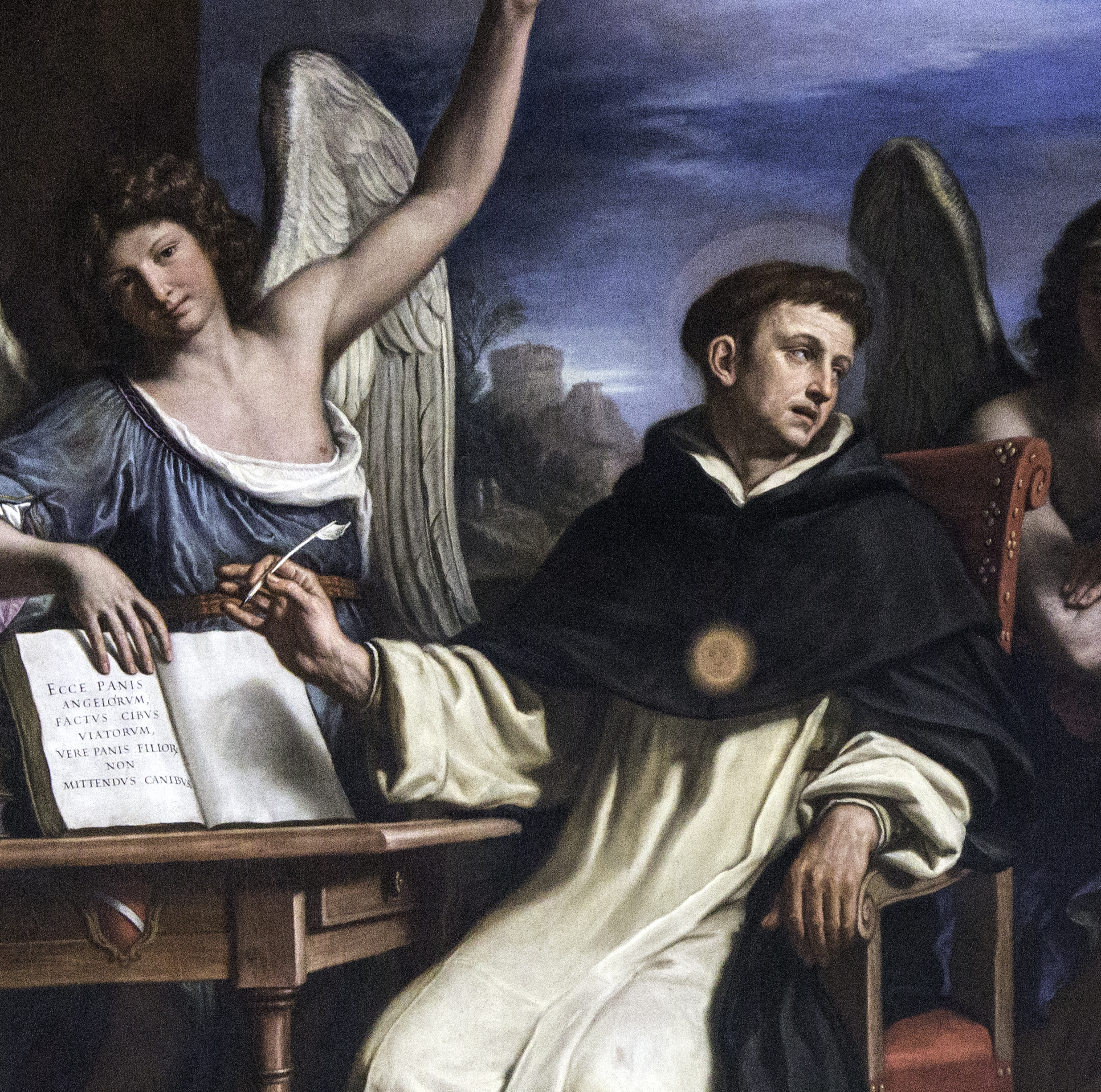Chapter 27: The Nature Of The Soul¶
Its Spirituality And Immortality 624¶
The soul of man is not only simple or unextended, as is the soul of plant and animal, but it is also spiritual, that is, intrinsically independent of matter, and therefore subsistent, so that is continues to exist after its separation from the body. These statements are proved by the soul’s intellective activity, because activity follows being, and the mode of activity reveals the mode of being. How do we show that intellective activity is independent of matter? By the universality of the object, which the intellect abstracts from the particular and limited sense world. Among the truths thus discovered are universal and necessary principles, independent of all particular facts, independent of all space and time. 625.
This necessity and universality, we now note, is manifest on three levels of abstraction. 626 On the first level, that of the natural sciences, the intellect, abstracting from individual matter, studies, not this mineral, plant, or animal perceived by the senses, but the inner universal nature of mineral, plant, or animal. 627 On the second level, that of the mathematical sciences, the intellect, abstracting from all sense matter, from all sense qualities, considers the nature of triangle, circle, sphere, or number, in order to deduce their necessary and universal characteristics. Here it appears clearly that man’s idea of the circle, for example, is not a mere image, a sort of medium between great and small circles, but a grasp of some nature intrinsic in each and every circle, great or small.
Again, though the imagination cannot represent clearly to itself a polygon with a thousand sides, the intellect grasps the idea with ease. Thus the idea differs absolutely from the image, because it expresses, not the sense qualities of the thing known, but its inner nature or essence, the source of all its characteristics, not as imagined, but as conceived.
Lastly, on the third level of abstraction, the intellect, abstracting entirely from matter, considers the intelligible being inaccessible to the senses. This being, this inner reality, is not a special sense quality, like sound, nor a common sensory quality like extension, but something grasped by the intellect alone, as the raison d’etre of reality and all its characteristics. Intellect alone grasps the meaning of the little word “is,” which is the soul of every judgment made by the mind, which is presupposed by every other idea, and which is the goal of all legitimate reasoning. Being then, that which is, since it does not involve any sense element, can exist beyond all matter, in spirits, and in the first cause of spirits and bodies.
On this third level of abstraction, then, the intellect recognizes the characteristics of being as such: unity and truth and goodness. From the very nature of being, of inner reality, derive the principles, absolutely necessary and universal, of contradiction, causality, and finality, principles which reach out immeasurably beyond the particular and contingent images pictured by the imagination, reach even to the existence of a first cause of all finite things, of a supreme intelligence, regulating the universe. By its own act, lastly, the intellect recognizes its own kinship with the immaterial world.
To summarize. Our mode of intelligent activity proves the immateriality of our soul, and immateriality founds incorruptibility, 628 since a form which is immaterial is uncomposed and subsistent, hence incorruptible.
Here lies the meaning of man’s desire for immortality. Since the intellect, says the saint, 629 grasps a reality beyond time, every intellectual being desires to live forever. Now a natural desire cannot be void and empty. Hence every intellectual being is incorruptible.
How does the human soul come into existence? Since it is immaterial, it cannot come from the potency of matter, i. e.: it cannot arise by generation, hence it must arise by God’s creative power. That which acts independently of matter, says the saint, 630 must have this same independence, not only in its existence, but also in its manner of receiving existence.
Is our universal and necessary knowledge a proof that we can be elevated to an immediate knowledge of Him who is subsistent being itself? Not a proof, says the saint, 631 but at least a sign. 632.
We may insert here two of the twenty-four Thomistic theses.
The fifteenth: The human soul is of itself subsistent. Hence at the moment when its subject is sufficiently disposed to receive it, it is created by God. By its own nature it is incorruptible and immortal. 633.
The eighteenth: Intellectuality is a necessary consequence of immateriality, and in such wise that levels of intellectuality are proportioned to their elevation above matter. 634.
Here Suarez 635 differs notably from St. Thomas.
- 624
Ia, q. 75.
- 625
Ibid.: a. 5
- 626
See the saint’s commentaries on Aristotle, Met.: 1, lect. 10; III, lect. 7; VI, lect. I; VIII, lect. I; XII, lect. 2.
- 627
Ia, q. 75, a. 2
- 628
Ibid.: a. 6
- 629
Ibid. Intellectus apprehendit esse absolute et secundum omne tempus. Unde omne habens intellectum desiderat esse semper. Naturale autem desiderium non potest esse inane. Omnis igitur intellectualis substantia est incorruptibilis
- 630
Id quod operatur independenter a materia, paritcr est et fit seu potius producitur independenter a materia. Ia, q. 118, a. 2.
- 631
Ia, q. 12, a. 4, ad 3
- 632
See Ia, q. 85, a. 7, for proof that the soul of man is specifically distinct from the angels
- 633
Per se subsistit anima humana quae, cum subjecto sufficienter disposito potest infundi, a Deo creatur, et sua natura incorruptibilis est atque immortalis.
- 634
Immaterialitatem necessario sequitur intellectualitas, et ita quidem ut secundum gradus elongationis a materia, sint quoque gradus intellectualitatis
- 635
Disp. met.: V, 5; XXX, 14, 15
